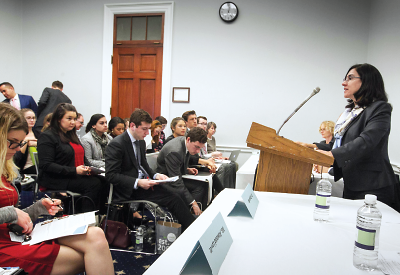In a briefing held by APA and the American Society for Addiction Medicine on Capitol Hill last month, a panel of addiction experts and patient advocates told congressional staffers that greater funding for medical research and the treatment of addiction will be needed to stem the tide of opioid addiction and overdose deaths plaguing the country.
APA President Maria A. Oquendo, M.D., Ph.D., who led the discussion, noted that greater funding and support for medication-assisted treatment (MAT) programs were key to reversing the trend of overdose deaths in the United States, which have risen sharply in recent years.
“We happen to be very lucky that we have medications that work to treat opioid use disorder,” said Nora Volkow, M.D., director of the National Institute on Drug Abuse (NIDA). Methadone, naltrexone, and buprenorphine—the three medications that have been approved by the Food and Drug Administration to treat opioid addiction—can prevent relapses and overdoses when used correctly, she said.
Kyle Kampman, M.D., a professor of psychiatry at the Perelman School of Medicine at the University of Pennsylvania, described the differences between each of the three medications. While each has shown efficacy in treating opioid addiction, he was quick to point out that other approaches and treatments are needed to turn the tide. He also discussed their availability. Methadone must be dispensed in a federally overseen opioid treatment program, whereas naltrexone and buprenorphine are more accessible because they can be prescribed in an office-based setting.
“The medications I’ve talked about today do not cure anything,” said Kampman. “At best, they help prevent relapse. They are the glue that helps our patients stay in treatment.” He also noted that it is impossible to judge which medication is best for treating opioid use disorder, as no head-to-head trials have been conducted.
Addiction counseling in concert with MAT has proven effective in treating opioid use disorder, but stigma and a lack of education and training around the treatment of addiction still account for significant barriers to care for millions of patients across the country.
“[Addiction] has always been considered and stigmatized as a moral failure, and as a result of that, the health care system has not taken the responsibility of participating in the screening, prevention, and treatment of substance use disorders,” said Volkow.
Ginny Atwood Lovitt, executive director and co-founder of the Chris Atwood Foundation, a nonprofit organization devoted to increasing access to naloxone, described how stigma and the prohibitive cost of treatment for her brother Christopher ultimately resulted in his death from a heroin overdose.
“He was met with stigma, with denied insurance coverage, with blame, shame, and guilt at every turn,” said Atwood Lovitt. “This is despite the fact that my family was on board with [his treatment] from day one.”
While many deaths from opioid overdose happen accidentally, Oquendo noted that a significant number are actually suicides.
“Persons who suffer from opioid use disorder are highly stigmatized,” Oquendo said. “They often talk about their experience that others view them as not deserving of treatment, not deserving to be rescued from overdose.
While the economic impact of the opioid epidemic is in the billions of dollars and continues to climb, Oquendo rejected the idea that those caught up in the vicious cycle of addiction aren’t worth the effort of saving.
“The devastating impact of this brain disorder is worth addressing,” she said. “People who could be productive members of society and contribute to their families, their communities, and the general economy deserve treatment and attention.”
Oquendo ended her remarks by reminding the congressional staffers in the room that an infusion of research funding is needed if the United States is truly determined to end the opioid crisis and develop effective treatments.
“As a country, we desperately need to understand what causes some individuals to become addicted when exposed to opioids, and for that we need funding for research into the biological basis of the disease. As a country, we desperately need to know what the best treatments are for a given individual, and for that too, we need funding for research to determine the best biomarkers for treatment response.” ■
APA is a partner in Providers’ Clinical Support System for Medication-Assisted Treatment. Training provided by the organization can be accessed
here.

